HIT CHANNEL EXCLUSIVE INTERVIEW: January 2016. We had the great honour to talk with a legendary musician and composer: Fred Frith. He is best known as the guitarist of Henry Cow, a very important experimental rock band. He was also a member of Art Bears, Massacre, Skeleton Crew and has collaborated with Brian Eno, Robert Wyatt, Syd Barrett, Mike Oldfield, The Residents, John Zorn, Bill Laswell and many others. Recently, he re-released “Propaganda”, which comprises 21 pieces for dance, written in 1987. In addition, he wrote the music for the short documentary “Last Day of Freedom”, which has been nominated for an Oscar this year. Read below the very interesting things he told us:
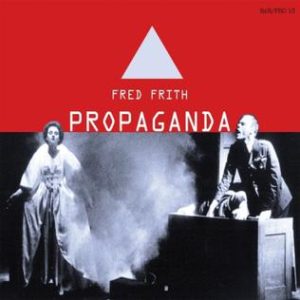 Why you decided to release “Propaganda” 28 years after its recording?
Why you decided to release “Propaganda” 28 years after its recording?
I’ve been steadily re-releasing all my older recordings since almost 20 years now. “Propaganda” was a special case because the stereo master was missing, and in any case the LP release had to fit on to one side of an LP, so parts were left out. Putting the music back together from original sources and finding and adding the things that were missing was time consuming, and time is something I never have much of. Finally enough people were writing to ask about it that I thought I should bite the bullet and finish the job!
What are the current projects you are involved in?
My main project is teaching – since 1999 I teach composition and improvisation at Mills College in Oakland, California, and five years ago a started to split that job with helping run the improvised music Master’s Degree at the Musik Akademie in Basel, Switzerland. When you add my being a guest professor at the Universidad Austral in Chile it doesn’t leave much time for other things. However, I continue to compose (most recently for percussion quartet and prepared piano), make film soundtracks (the short documentary “Last Day of Freedom” by Nomi Talisman and Dee Hibbert-Jones, for which I made the music, has been nominated for an Oscar this year), and record (records with my trio, and with Ikue Mori, and also a live Massacre double CD are all currently in production).
Did you expect when you recorded “Guitar Solos” in 1974 that it would become a classic album? Why Captain Beefheart (Don Van Vliet) said that you were ripping him off on this album?
Of course I didn’t have any idea what “Guitar Solos” would become. You never do, you just get on with the work. I think Don was referring to the title “No Birds”, which is a line from one of his songs!
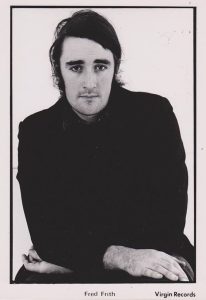 How did it happen to play on Brian Eno’s “Before and After Science” (1977) and “Music for Films” (1978) albums? I have read that you were banging a guitar with drumstick in a rhythm section with Phil Collins!
How did it happen to play on Brian Eno’s “Before and After Science” (1977) and “Music for Films” (1978) albums? I have read that you were banging a guitar with drumstick in a rhythm section with Phil Collins!
Brian was introduced to my work by Robert Wyatt, and we began to hang out a bit. It was during the year before I moved to New York, and we got along, so it was a natural progression. I would love to hear those Phil Collins rhythm tracks again, they’ve never been released…
How emotional were the Henry Cow reunion shows in 2014, as a tribute to Lindsay Cooper (bassoon, oboe)?
Very. Both on and off stage. It was a truly moving and wonderful experience to celebrate Lindsay’s music in that way with all the original cast.
How important was the first Peel Session for BCC Radio 1 (February 1972) to the later career of Henry Cow?
Critical. I don’t think we would have continued without that support, which drew attention to us from a lot of important people, not least the folks from Virgin Records..
When you finished the “Leg End” session, had you realised that you created a revolutionary album?
Like I said, we didn’t think like that. It’s hard enough making the work without worrying about its “significance” which is out of our control anyway. When we finished we were already thinking about what to do next…
Do you think Art Bears’ “Hopes and Fears” (1978) album, was the beginning of the end for Henry Cow?
Yes of course. We decided right after making it that it wasn’t a Henry Cow record, and that led to our differences coming to—and staying on—the surface. It was time.
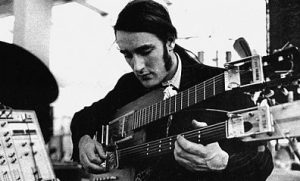 Looking back, did Virgin Records help or harm Henry Cow?
Looking back, did Virgin Records help or harm Henry Cow?
Help, very much so! Without that support, no European tours, no press—they put us on the map and gave us the means to make our first three LPs in unbelievably luxurious conditions, and gave us warm and friendly encouragement. It couldn’t have lasted for all kinds of (mostly commercial) reasons, but I’m still very grateful to them.
In Henry Cow you discussed everything to death. Is it possible that some good ideas never materialized because of this process?
We all survived the band, so maybe death is the wrong word? Working in a collective is a commitment, and it means letting go of a lot of things. But the gains easily outweigh the losses in my opinion, even if it can be frustrating at times. Good ideas don’t have to de-materialize, they can also become better ideas! And sometimes you can lose sight of the quality of what was there in the first place.
Can you tell us about your brief collaboration with Syd Barrett and the Last Minute Put Together Boogie Band in 1972?
It was very brief indeed. My friend Jack Monck was trying to help Syd get his music out there, and invited me to join a band with those two and Twink (ed: Tomorrow, The Pretty Things, Pink Fairies –drums). After one rehearsal and one concert I decided that this was a lost cause and moved on. Syd simply wasn’t able to function any more in a way that made sense.
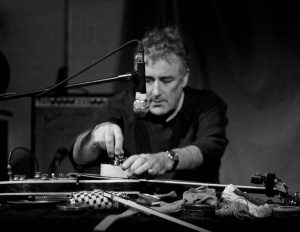 What was the original concept of Rock In Opposition (RIO)?
What was the original concept of Rock In Opposition (RIO)?
To bring together a number of groups who felt they occupied some kind of common ground—mostly to do with independence from and resistance to the commercial music industry—with the hope of helping them to become better known in each others’ countries.
Do you have happy memories of the Henry Cow tours with Robert Wyatt? You even played viola on his “Rock Bottom” (1974) album.
We did three gigs with Robert, London, Paris and Rome. They were wonderful, memorable experiences. Robert and I had a long history going back to when I would bug him to let me join Soft Machine when I was still a student—I was pretty excited. I had been invited to join Matching Mole right before the accident, so it felt quite natural to be involved afterwards. The viola playing led to my being asked to play on Ivor Cutler’s record “Velvet Donkey” (1975), which was an added bonus!
Do you think playing with different people, is a form of evolution too?
Don’t understand the question. I play with the same people since 40 years, and the music continues to develop in all directions. I also like to meet new players. It’s stimulating however you look at it, if you’re ready to be stimulated…
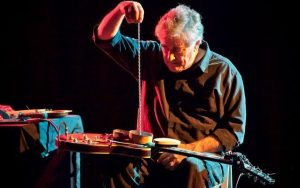 Was it a wise decision to move to New York in 1978? You did a lot of interesting collaborations during that period.
Was it a wise decision to move to New York in 1978? You did a lot of interesting collaborations during that period.
It was a piece of luck. Henry Cow had broken up, I was at a loose end, and Giorgio Gomelsky (RIP, bless him) sent me an airline ticket to come and check out what was going on. I met Bill Laswell and Michael Beinhorn on the first day, and The Residents, The Muffins, Glenn Branca and a lot of other people on the second. On the third day Rhys Chatham invited me to come back and do a solo concert at The Kitchen. Next day I went home, but everything had changed. I moved there a few months later. Between 1979 and 1983 I made “Gravity”, “Speechless”, “Cheap at Half the Price” (ed: solo albums), two more Art Bears records, started Massacre, recorded with Aksak Maboul, Material, The Residents, John Zorn, Eugene Chadbourne, and Lindsay Cooper, produced records by The Muffins, The Orthotonics, Etron Fou Leloublan, and V-Effect, and performed improvised concerts all over the place. Seems like I had plenty to do, wise or not.
Do the professor duties at Mills College distract you from creating more music?
They don’t distract me, but they take up a lot of time for sure.
Is it a coincidence that one of your biggest influences, John Cage, was also a professor at Mills College (and Steve Reich was student)?
Cage was an accompanist in the dance department at Mills College, not a professor. The fact is that just about everyone of note passed through Mills at some time or other in the last 50 years, and I consider it to be an honor to be here. (Pauline Oliveros, Lou Harrison, Terry Riley, Joëlle Léandre, Alvin Curran, Anthony Braxton, Hilda Paredes, Roscoe Mitchell and on and on).
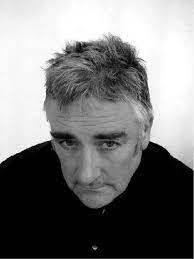 Did punk rock have anything to do with music or it was just a marketing invention? Chris Cutler (Henry Cow –drums) called punk rock groups like the Sex Pistols as “money hoovers”.
Did punk rock have anything to do with music or it was just a marketing invention? Chris Cutler (Henry Cow –drums) called punk rock groups like the Sex Pistols as “money hoovers”.
Since punk rock very much still exists, and exists almost entirely independently of the music industry, I would say that to dismiss it as a “marketing invention” is going a bit far! You can like it or dislike it but its practitioners are sincere and motivated. For a brief time between 1977 and 1980 the record industry gobbled it up and spat it out again, but the impulses that gave rise to it are still there and it’s now probably closer to what its rhetoric claimed it to be. Musically I kinda feel like it doesn’t really have anywhere to go, and the fact that has been used in support of both extreme right as well as extreme left causes tells you what you need to know..
Do you think social media like Youtube and Facebook, help younger listeners to learn about your music?
I have no idea. Why only young ones?
Was the “Step Across the Border” documentary (1990) a life changing experience for you? Which way did it affect you?
It taught me to accept myself for who I am. That was pretty life-changing!
Is it flattering that you received the 2008 Demetrio Stratos Prize for your career achievements in experimental music? Were you familiar with his music? (Demetrio Stratos was Greek like me).
I met Demetrio in Italy when we shared a bill with Area, and I really loved his work (also the more experimental solo voice work, for example). To receive this prize was a great honor.
A huge “THANK YOU” to Mr Fred Frith for his time and the great answers.
Official Fred Frith website: http://www.fredfrith.com

